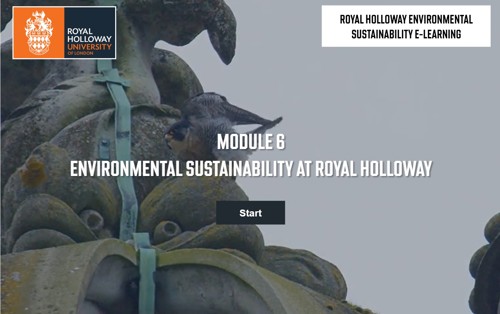We aim to leverage our Research and Education expertise to encourage, equip and empower our students and staff to be leaders in environmental sustainability.
We’re building momentum. Our academics have made several successful bids across Environmental and Living Sustainably themes to research funders.
We have a growing partnership network, which includes the Royal Botanical Gardens, Kew, with which we are launching new joint Masters programmes; Natural England, which has a member of its staff on secondment within the Research and Innovation Directorate; and the London Borough of Hounslow, with which we are working to advance a series of projects, placements and co-supervised PhDs.
Utilising our combined expertise, over 100 modules across our six schools now have an Environmental Sustainability theme within them and we’re scaling up our capacity to provide Carbon Literacy certification.
Further information
Centre for Research into Sustainability (CRIS)
The Centre for Research into Sustainability (CRIS) is a multidisciplinary, international group of researchers and educators at Royal Holloway, University of London, UK. We are actively engaged with the understanding of social/ethical, economic and environmental sustainability in contemporary society.
Our purpose, ultimately, is to advance scholarship and contribute to positive social change in terms of the contemporary challenges of poverty alleviation, social injustice and climate change.
Our commitment to Education for Sustainable Development (ESD)
Curriculum and learning design at Royal Holloway will equip our students with the skills and knowledge to ensure they are able to live and work in a way that supports sustainable practice and behaviours.
Through a new Curriculum Framework to be launched in 2026, all new courses at Royal Holloway will map the skills acquired through subject learning with clear demonstration of the equivalence and application of those skills to the Education for Sustainable Development learning outcomes.
From 2027 existing courses will be required to complete the same exercise as they enter our periodic review cycle.
Our quality assurance processes will therefore require, embed and monitor this action, providing a guarantee of exposure and training for all students in this area.
Academic course design teams and module leads will be empowered to deliver on this requirement through training and resources provided as part of the Curriculum Framework toolkit. Here, as well as guidance on mapping skills to the ESD learning outcomes, academic colleagues will be provided with a range of best-practice peer and sector examples of ways to integrate these skills into curriculum, learning and assessment design.
In addition as part of the skills architecture of our degrees we are committed to providing skills-building opportunities for students that extend beyond and augment their subject studies.
In 2025/26 we will launch a pilot of a cross-disciplinary module that offers students a future-facing skills offering including: the opportunity to learn a language; to model solutions to a global challenge through multi-disciplinary collaborative working; to undertake skills training opportunities including carbon literacy training and EDI training. The pilot will first offer this as a co-curricular opportunity but will explore the scope to offer the module as credit-bearing from 2026/27.
Carbon Literacy training
We introduced Carbon Literacy® training to Royal Holloway in 2021.
The day’s worth of training, which focuses on empowering participants to choose their own impactful climate solutions, leads to certification as Carbon Literate by the Carbon Literacy Project.
Hear below from Christopher Cipkin, our Director of Library, Learning Support & Culture, on just some of the ways that Carbon Literacy Training is having an impact across Royal Holloway.
Environmental Sustainability E-Learning
In July 2025 we launched our new Royal Holloway Environmental Sustainability E-Learning course.
Through this training, we hope to provide lots of interesting information about climate change and sustainability on campus, as well as pass on some of the skills and tools that everyone can use to help reduce Royal Holloway’s emissions and achieve it’s ambitions to:
- Promote Education for Sustainable Development across the curriculum to equip our community with the skills to mitigate the climate crisis.
- Support the United Nations Sustainable Development Goals through research and partnerships.
- Achieve Net Zero.
- Continue waste reduction.
- Improve water efficiency.
- Increase biodiversity and climate resilience on campus
The training, which consists of six bitesize modules, is mandatory for all staff and will also be available to all students.

Key undergraduate and masters courses
Study environmental sustainability at Royal Holloway and contribute to solving global challenges.
Choose from one of our expert-led degrees addressing critical issues, including:
- BSc Health Studies
- BSc Environment & Social Change
- BSc Geography
- BSc Geosciences & Sustainable Energy
- BSc/MSci Earth, Climate & Environmental Change
- BSc Ecology & Conservation
- MSc Global Health: Food Security, Sustainability & Biodiversity
- MSc Global Health: Human Health & Environment
- MSc Global Futures: Justice, Development and Sustainability
- MSc Sustainability and Management
- MSc Engineering Geology and Hydrogeology
Explore more options on our Course Directory.
Laboratory Efficiency Assessment Framework (LEAF)
We signed up to LEAF in December 2024. Recognising that laboratories are extremely energy and resource intensive LEAF is a standard set by UCL to improve their sustainability and efficiency. Laboratories can be awarded Bronze, Silver of Gold accreditation depending on the number of sustainability actions in place.
LEAF was tested at Royal Holloway, University of London on the Department of Geography’s Tephrochronology Laboratory. The lab team were successful in their application for a Silver award, gaining us our first accreditation.
We are continuing to pilot the scheme in Geography and Biological Sciences with the aim of rolling LEAF out to all departments in Term 3.

Concordat for the Environmental Sustainability of Research and Innovation Practice
The letter of commitment to the priorities of the Concordat for the Environmental Sustainability of Research and Innovation Practice can be viewed here.






















